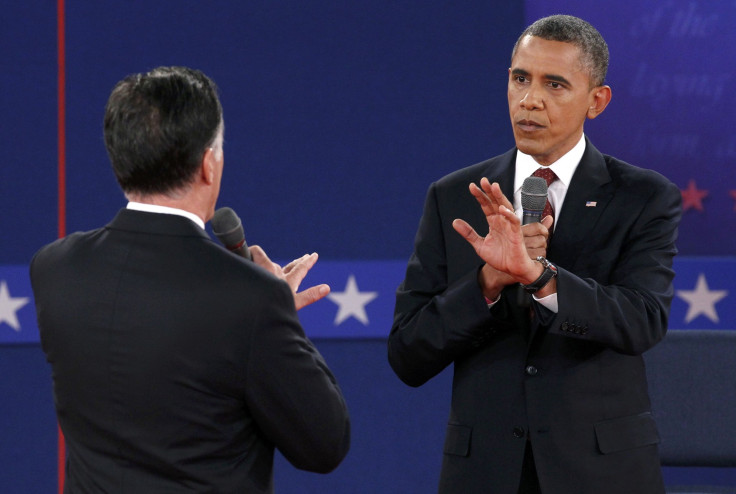Final Presidential Debate: Why Obama Needs A Clear Win In Round 3

Foreign policy and national security have taken a back seat to the economy and jobs in the 2012 presidential election, but having a Democratic president with strong credentials on turf long dominated by the Republicans is tough for the GOP, which will be fighting to reclaim public trust in those areas.
President Barack Obama and Mitt Romney will meet Monday night for a final debate on foreign policy at Lynn University in Boca Raton, Fla. The pressure is on both men, for different reasons.
Romney's challenge tonight is to provide millions of Americans the details of his foreign policy without alienating many of them, while Obama will need to address long-standing criticism that he hasn’t delivered on his foreign policy promises.
“Any exchange through which one candidate can be seen as losing credibility can carry weight,” said Clara O’Donnell, non-resident fellow at Brookings Institution. “How they convey their issues can also have an effect.”
In the first presidential debate three weeks ago, an aggressive Romney took charge and has steadily closed the gap with the president in the polls ever since. Obama came back in the second debate last week, and had his rival dig himself into a hole on the Benghazi, Libya, terror attack.
“Everything depends on whether both candidates can avoid a major gaffe, or in the president’s case, avoid looking like a charter member of 'The Walking Dead' as he did in the first debate,” said Thomas Whalen, a political historian at Boston University. “I do think more pressure is on Romney given that he and his running mate, Paul Ryan, are so light on foreign policy credentials in their political resumes.”
Obama has some strong points heading into the third debate. Following former President George W. Bush’s unpopular Iraq war, Democrats took charge and showed that they too, can be tough on national security and foreign policy. Al Qaeda’s leader Osama bin Laden was killed on Obama’s watch and his orders. Obama promised to end the Iraq war and he did, with the U.S. combat role in Afghanistan on a path to close in two years.
“President Obama needs to more or less just hold serve and remind voters of his big foreign policy successes, the killing of Osama bin Laden chief among them,” Whalen said. “If the president does badly, then this will greatly damage him going into Election Day, as foreign policy has been his best argument for re-election to date. Put another way, his best strength is being commander-in-chief rather than just president.”
Still, experts like Julian Zelizer, who teaches history and public affairs at Princeton University, believe Democrats stand to lose a lot if Obama doesn’t do well in Monday night’s debate.
In an opinion piece for CNN, Zelizer wrote, “For several decades, the public trusted Republicans on the issue of national security. Since Vietnam, Republicans hammered away at Democrats as being weak on defense and unwilling to do what was necessary to protect the nation.”
But the violent outbreaks in the Middle East and the Sept. 11 attack on the U.S. Consulate in Benghazi leave the administration open for attacks.
“The politics of national security is tricky, and uncontrollable events can easily push politics in a different direction,” Zelizer wrote. “Obama will have to answer some of the tough questions that have emerged, and this time Romney is going to be prepared to handle them more effectively and to show that his overall agenda still offers the U.S. the best path forward.
“Monday’s debate can have a big impact, not just on the outcome in November, but on how the public thinks about whom they should trust when it comes to national security.”
Obama has strong credentials on national security matters and the Republicans are aware of this, as they have been portraying him as one who is sacrificing allies and compromising with enemies.
Romney’s foreign policy resume is by contrast rather thin, and he will need to avoid another “binders full of women” incident and look more presidential this time around.
“He needs to look not so brazenly opportunistic as he did on the Libyan terrorist attack last week,” Whalen said. “People will be expecting fireworks but I have a feeling both candidates will be rather muted in their verbal interplay tonight.
“When it comes to foreign policy, it’s always best to be seen as cool and collected rather than being a hothead,” he added. “I sincerely doubt it will reach the level of rancor it did in the last debate. Plus, I think tonight’s moderator, Bob Schieffer of CBS, is far more capable than his predecessors in gaining control of a situation. He can be tough but in a pleasant, nice way,” according to Whalen.
© Copyright IBTimes 2024. All rights reserved.






















